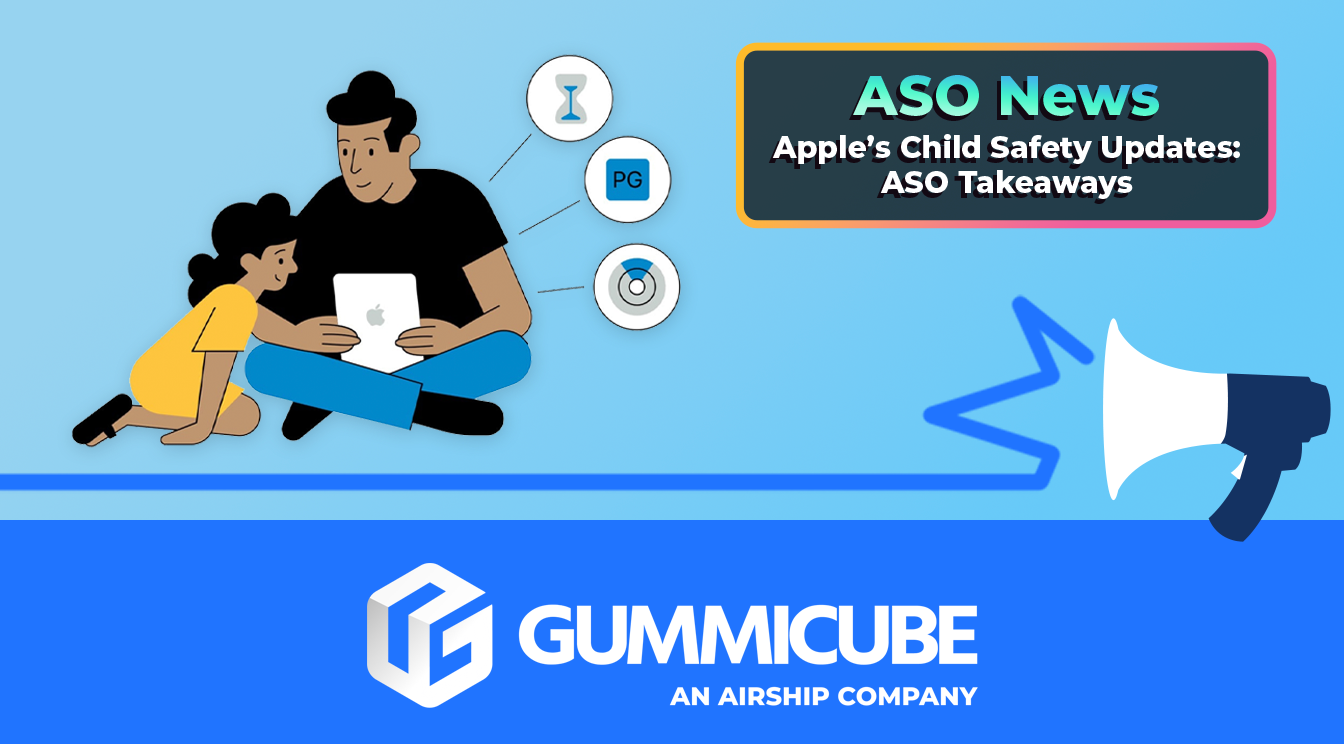
Apple’s Child Safety Updates: ASO Takeaways
Posted on March 28th, 2025
Apple’s child safety updates will impact App Store visibility for certain age groups. Learn how these changes affect ASO and how to optimize for your audience.

Today, Apple released updates to its App Store Review guidelines that developers must adhere to when submitting their new apps or existing app updates. The changes vary in size and scope: some are language clarifications on existing guidelines, while others are part of longer spanning initiatives Apple has in store for the App Store.
Whether a small adjustment or a huge change, it’s important to read up on the latest regulations any time Apple makes an update to the App Store Review Guidelines. Below are some of the key changes to keep in mind and how they may impact your App Store Optimization and mobile app marketing strategies.
Some changes are more for clarification of existing rules than they are for creating new ones. As an example, section 1.4.3 has been changed to state:
Facilitating the sale of controlled substances (except for licensed pharmacies), marijuana, or tobacco is not allowed.
Previously, this section stated:
Facilitating the sale of marijuana, tobacco, or controlled substances (except for licensed pharmacies) isn’t allowed.
This change makes it clearer to the reader that licensed pharmacies can facilitate the sale of controlled substances, however facilitating the sale of tobacco and marijuana are not allowed altogether. While this has always been the case, the language used helps avoid confusion.
Another semantic change, section 3.1.3(d) has been updated to cite “person-to-person services” instead of “person-to-person experiences”:
from:
If your app enables the purchase of realtime person-to-person experiences between two individuals (for example tutoring students, medical consultations, real estate tours, or fitness training), you may use purchase methods other than in-app purchase to collect those payments. One-to-few and one-to-many realtime experiences must use in-app purchase.
to:
If your app enables the purchase of realtime person-to-person services between two individuals (for example tutoring students, medical consultations, real estate tours, or fitness training), you may use purchase methods other than in-app purchase to collect those payments. One-to-few and one-to-many realtime services must use in-app purchase.
Another small language change, this can help clarify to users what does and does not require in-app purchase- which has been a hotly debated topic in the past year with Epic Games’ controversial circumvention of IAP and even further back to Spotify’s “Time to Play Fair” campaign.
In short, an individual person-to-person service, such as a home cleaning facilitated through the app, would not subject to in-app purchase. Creating a section of the app behind an in-app purchase wall containing home cleaning how-to videos would be.
One of the biggest changes in today’s announcement is Apple’s addition to section 5.1.2(i):
You must receive explicit permission from users via the App Tracking Transparency APIs to track their activity. Learn more about tracking.
While placed near the bottom of the change list, this is one of the biggest recent updates to the App Store Review Guidelines. Apple has been planning on this since the release of iOS 14, but had delayed it last year to allow developers and marketers more time to prepare.
This change, which will need to be be implemented by this spring with the launch of iOS 14.5, changes the “opt-out” method of sharing information via the Identifier for Advertisers (IDFA) to an “opt-in” system. Users will be soon asked if they want to give permission to share their IDFA with third parties upon app launch.
This policy change is another move by Apple towards increased user privacy. Some advertisers - namely Facebook - criticize that the almost certain drop in users allowing ad tracking will be detrimental to their ability to serve the right ads to the right users, and for companies to run cost-effective campaigns. While advertisers have had months to prepare for the change, there will definitely be adjustments to be made to serve ads in the new user data privacy-centric world Apple envisions.
Other notable changes include:
Check out Apple’s News and Updates for the full list of today’s changes.
These changes will mean different things for different developers; from the need to make a few edits to screenshots before the next update, to adjusting an entire advertising strategy. The App Store is constantly evolving, and staying on top of the latest App Store Review Guidelines will ensure your app will be there to evolve along with it.
Want to learn more about App Store Optimization? Contact Gummicube and we’ll help get your strategy started.

Apple’s child safety updates will impact App Store visibility for certain age groups. Learn how these changes affect ASO and how to optimize for your audience.

Google Play Games expands with new titles and PC support. Discover what this means for ASO and how to stay ahead in the evolving mobile gaming landscape.

Discover the March 2025 update to Apple Business Manager, and learn how it enhances device tracking, compliance, and operational efficiency for businesses.